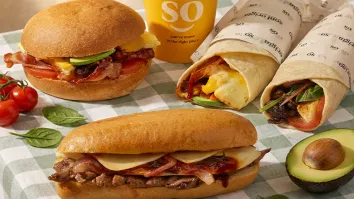
COVID-19 rescue package: reactions from Mad Mex, Bansal Group and Pretzel
Rent remains a colossal concern for brands.
Whilst helpful to businesses, questions remain on how the series of economic rescue packages by the Australian government will specifically address particular concerns in the quick service restaurant industry, restaurant bosses exclusively tell QSR Media.
“We applaud the Government’s commitment to businesses at this difficult time. However...there is not much information available yet outlining how [the QSR sector] will benefit and how the economic rescue package will assist with our particular set of challenges,” Mad Mex founder and CEO Clovis Young said in an interview.
Disseminating this information and “necessary” funding, Young says, is the next challenge the sector needs the government to solve quickly. He also would like to see representation from the sector to talk directly to the government on how to protect workers.
“The Australian [prime minister] has just announced the creation of a National COVID-19 Coordination Commission, which aims to have CEOs contribute to the urgent conversation on job preservation. Whilst this is a good start, given the size and scale of the QSR and hospitality sector in Australia, we need to be part of that discussion as our workers are some of the most vulnerable. They are often shift workers who have limited means to weather this storm,” he said.
Young suggested that the government could take a look at New Zealand’s employee subsidy package model. He said that this model allowed their business to pay staff during this enforced break.
“We have a business in New Zealand and their government has taken swift financial action to help the QSR sector directly by giving them an employee subsidy package. This allows us immediate access (to) vital funds to pay workers now the QSR sector is shut down to flatten the curve,” he explained.
Citing his banking background, Young said Mad Mex went into this crisis “in good shape”, expecting that the economy would take a hit “at some stage”.
“We didn’t know how or when it would happen, but we have been ensuring that the business was as robust as possible to face a national/global economic challenge,” he said.
The owner of The Bansal Group, which holds franchise rights to Carl’s Jr. and Cinnabon in Australia, expressed concerns about the country’s taxation system in light of the COVID-19 crisis.
“Businesses in Australia can't afford to survive with the current taxation system. Businesses that can't even survive two days after these restrictions tells you something about businesses in Australia. Most of the businesses are trading insolvent or taking shortcuts. Ground reality is so different and businesses in Australia can't make money,” he said.
Pretzel owner Brittany Garbutt said the stimulus package is a “balanced attempt” to provide relief.
“As things evolve and change, I would expect to see the stimulus do the same - to continue to cater. We as a company are pleased with the relief - but we still expect to suffer some difficult times,” she said.
Garbutt says her business, which has seven outlets, sees an opportunity in the stimulus package by receiving a 100% payment of the total PAYG (pay as you go) tax withheld to a maximum of $50,000 in a matter of months.
“As a business with an extremely low employment age average, we do not withhold large portions of tax. The majority of our staff do not make big sums each pay cycle. Rather, we have large amounts of staff making smaller amounts,” she said. “This creates an inadequacy in what we can benefit from. Whilst we have 113 staff (all making wages under the taxable level), other companies with similar payrolls will have perhaps half, or even a quarter of our staff, receiving bigger paychecks, and therefore more tax is withheld, and their payment is higher.”
But being a smaller business in the industry, Garbutt said they are also one of the hardest hit in this crisis.
“Having a minimum in place is your saving grace in this circumstance - but still will not reflect the entitlement we should be receiving by the ideology of the stimulus,” she said.
Garbutt also welcomed the wage subsidy for trainees.
“I think this initiative and particularly the lengthy time frame to which it applies (50% reimbursement of wages over 9 months) means we will continue to be able to receive support in the wake of the damage and therefore continue to support our trainees,” she said.
“The instant asset write-off is great for growing companies like ours, but likely no one has the cash to spend during that time frame, anyways - so it’s a bit moot.”
Why the package needs to support consumers too
Aside from providing relief to staff, Young also cited the need for packages to assist customers in order to ensure more spending.
“We need to support workers who then spend money in our businesses. If you give all the money to businesses, then the workers aren’t necessarily protected. That’s why what the New Zealand Government has done stands out. It helps people stay employed and gives them some stability during the uncertainty. In turn, by helping the consumer directly, this helps keep our industry and the economy afloat,” Young explained, adding that government’s investments in the quantitative easing programme could be “better spent” in consumers.
“They are the ones who will pump money back into the banking system anyway,” he said.
The need to address rent concerns
Both he and Garbutt also cited the need for packages to address rent concerns - an issue even prior to the pandemic.
“Some of the financial burden needs to be shared between landlords, government and industry,” Young said.
“[Rent] is eating up valuable cash flow. It is an obligation and we are at the mercy of those whom we rent from. From a business standpoint, aside from insurances this is our major non-flexing expense. When we produce less we spend less - but we never pay less rent. Freezing mortgage repayments would certainly help to provide some relief, but this is only temporary,” Garbutt said.
The biggest issue on rent, Garbutt said, is the length of time for mortgages to be frozen.
“Freezing now and leaving it for us to manage later will only help in the short term. If we cannot get back to work quickly, we are all just accumulating a debt - that at some point will still need to be paid and with each month that this continues, a business’ ability to pay back the accumulated debt will be diminished further,” she said.
To adapt to the crisis, Pretzel has set up a click-and-collect style website that is selling their menu as well as merchandise.
“We have retained 100% employment. This is a massive cost to the business, but one we can and want to accommodate. As the sole director these decisions fall squarely on my shoulders and as the sole profiter I find I am in a position (very fortunately, not all are) to take a massive personal hit for my staff. It was an easy decision, and I have chosen to do so,” Garbutt said. “All I ask is that our staff remain educated during this time on how they can best spend their earnings to help other businesses and therefore others in their community.”
Mad Mex, meanwhile, has set up an inhouse designated COVID-19 task force, giving their network up-to-date information and advice. Young also halved his salary to show solidarity to his staff.
Seeing shortages in supermarkets, the chain has also made basic food items available to staff for free to stock their emergency pantry.
“We are providing all staff with 2.5kg of rice and 3kg of beans to help them provide food for their families should they have to go into lockdown,” Young said.
Sector representation, impact on supermarkets
Young urged the QSR sector to collaborate at the highest level to ensure that its views and the needs of its teams are heard by the government so that they can help with pain points across the industry. “That possibly looks like a coalition of QSR business leaders coming together to represent our sector,” he said.
Young expressed concern of how the pandemic is impacting supermarkets, and how this will get worse if takeaway or delivery services by chains or other companies are suspended.
He asks: “If the government follow(s) the lead of other countries and we do go into a full lockdown of the industry, with no takeaway or delivery services available, what kind of pressure is that going to put on supermarkets? Do they have the capacity to cope with the increased demand for food if people are no longer able to rely on QSRs to provide delivery?"
“It’s a difficult balancing act but one that needs to be carefully considered by the government in order for the country to keep going under such difficult circumstances." he added.
Despite current concerns, Young is optimistic that the QSR and fast casual restaurant sectors will be able to bounce back. Consumers, he says, will be more price-conscious but will seek brands that promote health and well-being.
“The QSR sector tends to rebound well – far better than other parts of the dining industry – so the government should pay particular attention to supporting sectors that have long-term
viability for providing employment. I would like to see them ensure that this economic package gives our industry what it needs, so that we can emerge on the other side of these challenges ready to scale up again as fast as possible,” he said.
Lease terminations ‘unlikely’
Keypoint Law consulting principal Corinne Attard explained that measures for businesses with revenue under $50 million per annum with a credit against their PAYG tax and some income support for trainees would give them some cash flow relief, encouraging companies to retain staff instead of resorting to termination or standing down.
“Possibly more important are the changes to the insolvency laws, which will allow directors to keep trading without incurring personal liability even where the company is technically insolvent. Creditors will be unable to take action to put a company into...administration for a period of six months,” she said.
“However, this reprieve really only pushes the problem down the road so that overdue debts will continue to accrue interest...unless people talk to their creditors such as banks, suppliers and landlords to obtain relief from payment. I would encourage everyone to be pro-active although it is so hard with all the unknowns.”
From her vantage point, the introduction of the immediate jobseeker payments for staff stood down or terminated also helps businesses who are not able to operate for the next few months. But Attard noted that rent is indeed the “biggest pain point” that also needs to be addressed.
“This is being left to a case-by-case basis for businesses to manage themselves. Some landlords are offering rent abatement such as a simple turnover rent only to apply during this period – something like this allows QSRs to continue to operate in a limited way with takeaway and delivery capacity. If not, then we are going to see more closures,” she warned.
Attard does expect “many” landlords not inclined to be terminating leases at the moment even where rent is unpaid.
“There are unlikely to find replacement tenants in the immediate future and vacancies will devalue the property and perhaps impact the landlord’s funding arrangements. So I would encourage tenants to approach landlords to work out a commercial resolution. Of course if businesses close, there is likely to be a surplus of retail space which should mean reduced market rents for those who survive. For those who do succeed or at least survive they can also access the measures such as the instant asset write off to assist expansion and investment,” she advised.
Aside from the $189 billion series of rescue packages, the Australian government is expected to announce a wage subsidies package on Monday, 30 March.
(Editor’s Note: This is a developing story. Answers provided to QSR Media were prior to news about a third wage subsidies package.)
























